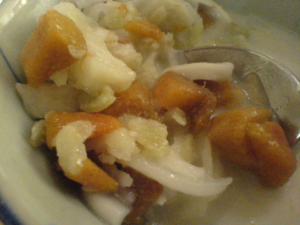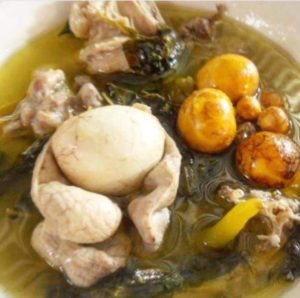My Cook, Sinampalukang Manok, and Ginatang Pinipig Disaster
I must go to the market as early as 6 a.m tomorrow lest I don’t find any pinipig at all, “that was my cook reminding me to give her the money for the things she had to get from the palengke (market) before I pass out. I got home from Vienna just the night before and still jetlagged.

My cook contemplating what to get for her sinampalukang manok (sour chicken soup)

Ginatang pinipig
Pinipig is young grains of malagkit rice variety (sticky rice) pounded until they become rice flakes. When used to make ginatang pinipig, you soak them for some time in fresh coconut milk. It is a specialty in my hometown, served especially during rice harvest season. You don’t cook it the usual way. And like any other grain flakes, they swell when soaked in liquid or coconut milk. It gets a distinct taste that is undeniably ginatang pinipig when the flavors from the other ingredients have blended, like sliced chico fruits, gabi (yam root crop), and fresh coconut strings. The concoction is then sweetened with white sugar and served when the flakes get soft but not mushy. A saccharine overload to you maybe, plain happiness to me, transporting me to that time of my childhood when, in November, the whole village celebrates the bounty they receive from San Clemente – our village’s patron saint. Our Pasalamat (Thanksgiving) takes place every 23rd of November of each year when eating pinipig becomes the highlight of the festival. No house celebration is complete sans ginatang pinipig. It is just a blasphemy when you cannot observe this Pasalamat tradition.
Ginatang pinipig gets fermented after soaking them in coconut milk for a couple of hours, reminding you of that taste and smell like that coconut oil the Lolas and young maidens of long ago would apply on their tresses — for an added luster and shine. (I never liked the smell of coconut oil in the hair, not that I ever used it on mine!) The leftover ginatan is then cooked over on a low flame and stirred until it thickens. Cooking this does not guarantee that it will not taste rancid when left overnight. Keeping it refrigerated may slow down spoilage, but there is no assurance it will last a day.
“So, how much money do you need? “I asked my cook.
“Give me 500 pesos (roughly €10) plus some extra for my pedicab ride, “was her reply.
“Don’t overspend, “I teased her.
“Overspend, with 500? “her quick retort, her voice squeaking. But, give her a thousand pesos, and she would see to it that she spends all, getting other extras like a pair of sandals she may fancy.
“And get a 100-peso worth of goto for Walter! “I said as an afterthought. Goto is a kind of rice porridge cooked with tripes and other beef internal organs. A sure gout trigger. I caught my cook, giving me a mean look before she left the house lest I ask her to get other things with the 500 pesos I gave her.
She came back with 2 kg of pinipig she got for 300 pesos, goto for Walter, and 25-peso loose change. The rest went to her pedicab ride, she said. “Why two kilos of pinipig? “I wondered. I thought that that was a lot, but I was not in the mood to discuss the issue any further.
I saw my two gardeners picking coconuts. “For the ginatan, cook’s order, “they said in unison, grinning. They were scraping the meat last time I checked on them. They got five coconuts, but the cook said she miscalculated the amount she needed, so gardeners had to pick some more. The garden can wait.
Meanwhile, Walter wanted to start cooking paprika-hendl (paprika chicken) and asked about the chicken wings and legs I brought home from the market the other day, something like 10 kg. So the cook marinated all of them in vinegar and fish sauce.

Sinampalukang Manok (Stewed chicken in tamarind broth)
“Didn’t you say you wanted me to make fried chicken wings and legs? “she asked in a voice squeakier than it already was. “And sinampalukang manok, too “(chicken in young tamarind leaves) — another food specialty from my hometown.
“Yes, my beloved cousin, “I snapped, teeth clenched. “But I remember getting twenty pieces of large chicken legs and five kg of chicken wings. But, of course, you don’t want to fry them all or make a cauldron of sinampalukan unless you’re feeding a marching brass band hired for the Pasalamat.
I invited a couple of guests for a simple Thanksgiving celebration at home, so Walter and I came up with this easy-to-make recipe. But, of course, a fiesta is no fiesta without sinampalukang manok and fried chicken, my cook said, so ok, do what you think is best, I told her. I didn’t know she would cook up a storm. Oh, for the marching brass band, how could I forget?
“But I left a few chicken wings for Walter, for whatever he wanted to do with them, “my cook again, hoping perhaps that I should thank her for being considerate. A few chicken wings, my foot!
“I’m afraid you don’t have enough chicken left for your paprika hendl,” I told Walter. I saw him roll his eyes, raise his head to the ceiling, hands clasped like in a prayer. So typically, Walter, when confronted with news happening beyond his grasp, mainly when news borders on the ridiculous or the insane. He sighed in frustration, cooed over his dogs as soon as he settled himself in his rocking chair.
“Was sollen wir turn, Kinder?” (What shall we do, Children?) The dogs, panting, wagged their tails, tongues hanging out, adoringly looked at him, excited to have his full attention again to themselves. My cook was unamused with what seemed to her as Walter’s “I don’t care” attitude. I should not wonder; the massive enamelware bowl, running over with frozen chicken meat, was getting weighty in her hands. It could drop anytime.
“Ano na? Anong gagawin ko sa manok?” (What now, what shall I do with the chicken?) she asked, getting impatient. “Gawing mong pork chop!” (Turn them into pork chops!) I was like Vilma Santos sneering at Albert Martinez in that hilarious scene in the movie Bata, Bata, Pano Ka Ginawa? I could see that she was not amused, so I left her in haste before she could say anything else, ignoring the clunk of something massive hitting the granite floor.
“You must have done something very, very wrong in your previous life that this is happening to you,” Walter said to me, poker-faced. My cook is my karma, he meant.

You can go hungry for all she cares, but she’s not going to miss her telenovelas.
“Too little coconut milk, “I overheard my sister-in-law telling my cook about her ginatang pinipig. She used milk from ten coconuts, and yet not enough, I thought to myself. No wonder she soaked all two kg of pinipig in coconut milk in one go and let the ginatan sit for one hour. The pinipig will absorb all the liquids when you do this, making them soggy and difficult to stir. She eventually asked my gardener to get some more coconut, but it did not help much; the ginatan was like kalamay (rice pudding). The same thing she did with the noodle soup Walter asked her to make for dinner. He said he bought two packs of penne, one big and one small. She cooked all the noodles, 2 kg of them, an hour earlier lest she missed her telenovelas, and let the soup sit long before it was dinner time.
“The pasta gets bloated, of course, the longer they are in the broth,” Walter stuttered — he always is when agitated — as he recounted the story of the fat noodles.
“I poked a fork over the overcooked pasta, and the fork got stuck in it.” So he tried to spoon out whatever liquid was spared at the bottom of the serving bowl — in vain.
“The ginatan is getting rancid; you must start cooking to prevent from getting spoiled,” my guests told my cook. She disagreed with them. You cook them only after some time, like later in the night, “she said, not a bit masking her annoyance, as if saying, “I know what I’m doing, so spare me the lecture! “Oh, sure!
“Do you mind tasting it? “my cook asked me after cooking the ginatan. “Panis na nga yata! “(Tastes like spoiled already). But, of course, it was beyond stale; no pigs will eat them.

An Octogenarian in March 2020, my cousin, my cook
“You must have done something very, very wrong in your previous life that this is happening to you now, “Walter told me poker-faced. “And you better start thinking of a replacement for your cook. She is losing it. “She’s turning 80 in March next year, hence. But, of course, easier said than done; she is my first-degree cousin, which makes firing her difficult.
Talking of getting old, she was furious in the market that day we were buying ingredients like those tender tamarind leaves for her sour chicken soup. The middle-aged vendor asked my cook if there was something else she needed. That should be all, my cook said.
“What about ginger? It would be best if you had ginger for this recipe,” the vendor reminded her.
“Oh, yes, ginger, “my cook laughed.
“How about tomatoes, onions?”
“Give me those as well.”
“Ulianin na pala kayo!” (Oh, you already have dementia!)
“ANO? Baka kayo!” (What? You perhaps!) My cook was shocked and furious.
“Lakas ng loob nya! “(She has the guts!). She was fuming mad the whole ride home. She could not get over the fact that a stranger would call her that — ulianin. The woman was right, I wanted to say, but I didn’t want to add insult to injury. Was I thinking out loud? Maybe, thus the ginatang pinipig disaster.